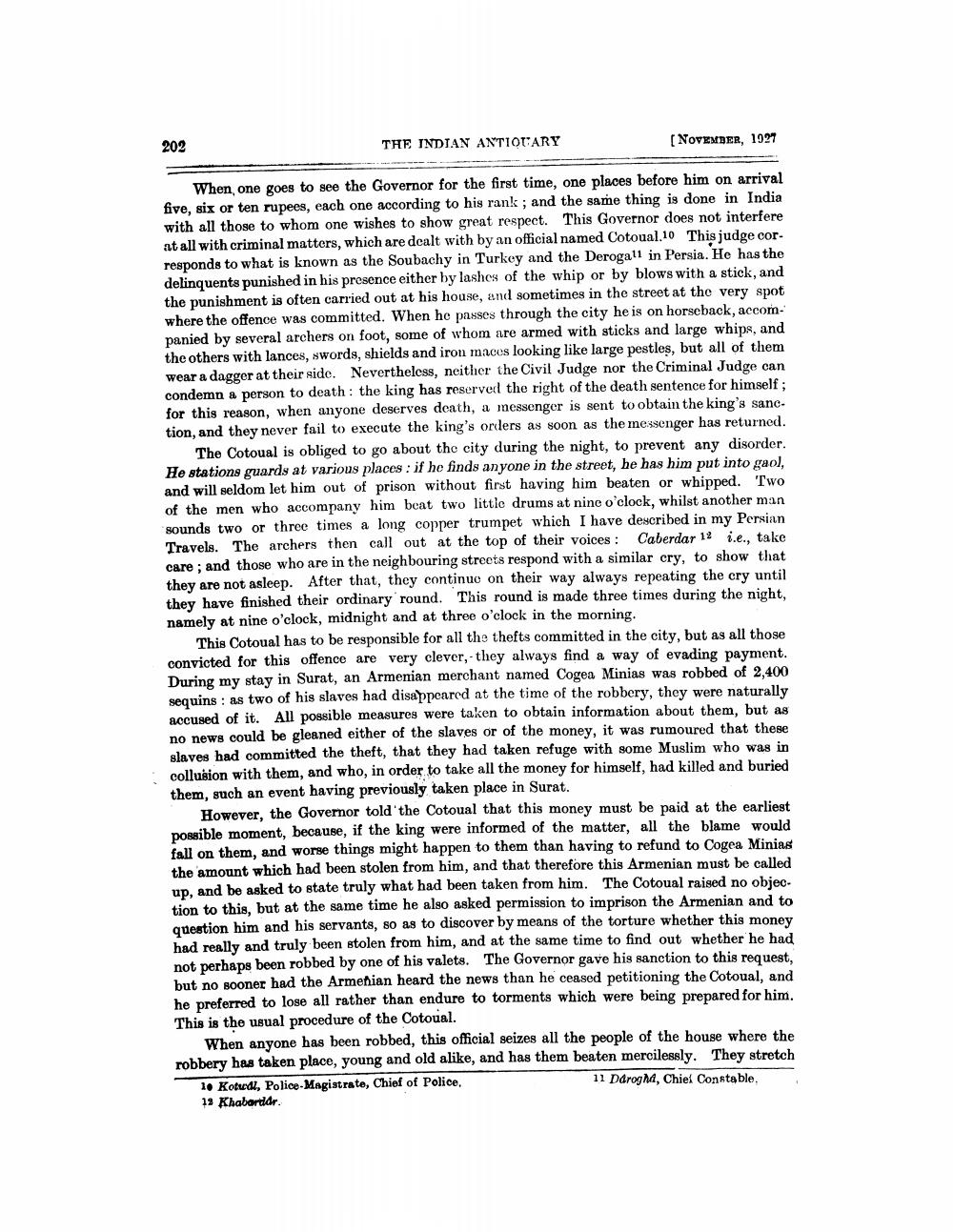________________
202
THE INDIAN ANTIOTARY
[ NOVEMDER, 1927
When one goes to see the Governor for the first time, one places before him on arrival five, six or ten rupees, each one according to his rank; and the same thing is done in India with all those to whom one wishes to show great respect. This Governor does not interfere at all with criminal matters, which are dealt with by an official named Cotoual.10 This judge corresponds to what is known as the Soubachy in Turkey and the Derogall in Persia. He has the delinquents punished in his presence either by lashes of the whip or by blows with a stick, and the punishment is often carried out at his house, and sometimes in the street at the very spot where the offence was committed. When he passes through the city he is on horseback, accompanied by several archers on foot, some of whom are armed with sticks and large whips, and the others with lances, swords, shields and iron maces looking like large pestles, but all of them wear a dagger at their side. Nevertheless, neither the Civil Judge nor the Criminal Judge can condemn a person to death: the king has reserved the right of the death sentence for himself; for this reason, when anyone deserves death, a messenger is sent to obtain the king's sanction, and they never fail to execute the king's orders as soon as the messenger has returned.
The Cotoual is obliged to go about the city during the night, to prevent any disorder. He stations guards at various places : if he finds anyone in the street, he has him put into gaol, and will seldom let him out of prison without first having him beaten or whipped. Two of the men who accompany him bcat two little drums at nine o'clock, whilst another man sounds two or three times a long copper trumpet which I have described in my Persian Travels. The archers then call out at the top of their voices : Caberdar 12 i.e., take care; and those who are in the neighbouring streets respond with a similar cry, to show that they are not asleep. After that, they continue on their way always repeating the cry until they have finished their ordinary round. This round is made three times during the night, namely at nine o'clock, midnight and at three o'clock in the morning.
This Cotoual has to be responsible for all the thefts committed in the city, but as all those convicted for this offence are very clever, they always find a way of evading payment. During my stay in Surat, an Armenian merchant named Cogea Minias was robbed of 2,400 sequins : as two of his slaves had disappeared at the time of the robbery, they were naturally accused of it. All possible measures were taken to obtain information about them, but as no news could be gleaned either of the slaves or of the money, it was rumoured that these slaves had committed the theft, that they had taken refuge with some Muslim who was in collusion with them, and who, in order to take all the money for himself, had killed and buried them, such an event having previously taken place in Surat.
However, the Governor told 'the Cotoual that this money must be paid at the earliest possible moment, because, if the king were informed of the matter, all the blame would fall on them, and worse things might happen to them than having to refund to Cogea Minias the amount which had been stolen from him, and that therefore this Armenian must be called up, and be asked to state truly what had been taken from him. The Cotoual raised no objec. tion to this, but at the same time he also asked permission to imprison the Armenian and to question him and his servants, so as to discover by means of the torture whether this money had really and truly been stolen from him, and at the same time to find out whether he had not perhaps been robbed by one of his valets. The Governor gave his sanction to this request, but no sooner had the Armenian heard the news than he ceased petitioning the Cotoual, and he preferred to lose all rather than endure to torments which were being prepared for him. This is the usual procedure of the Cotoual.
When anyone has been robbed, this official seizes all the people of the house where the robbery has taken place, young and old alike, and has them beaten mercilessly. They stretch 1. Kotud, Police Magistrato, Chief of Police,
11 Darogna, Chiel Constable. 13 Khabarddr.




